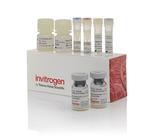Search Thermo Fisher Scientific
FIGURE: 1 / 4
Human MIP-1 beta ProQuantum Immunoassay Kit
(A) Antibody-antigen binding: Antibodies bind to two separate epitopes on the antigen (during a 1-hr incubation), which brings the two conjugated oligonucleotides into close proximity. (B) Ligation and amplification of signal (in a qPCR instrument): DNA ligase and a third splint oligonucleotide connector are added to ligate the two ends of the conjugated oligonucleotides, creating a 100-base DNA template. Once the ligase is inactivated at 95°C, the sample is amplified through 40 cycles of annea... View More




Product Specifications
Analytical sensitivity
Assay range
Sample type/volume
Hands-on time
Time-to-result
Homogenous (no wash)
Instrument
Product size
Contents
Antibody-Conjugate A
Antibody-Conjugate B
Antibody-Conjugate Dilution Buffer
Standard
Master Mix
Ligase
Shipping conditions
Storage
Protein name
Species (tested)
Assay kit format
Label or dye
About This Kit
The ProQuantum Human MIP-1 beta Immunoassay Kit is designed to provide quantitative measurements of human MIP-1 beta protein in small sample volumes. Utilizing proximity ligation assay (PLA) technology, the assay combines the analyte specificity of high-affinity antibody-antigen binding with the signal detection and amplification capabilities of real-time PCR to achieve a simple yet powerful next-generation protein quantitation platform. A user-friendly workflow combined with intuitive Cloud-based software for analytics enables sample-to-answer in just 2 hours.
• High sensitivity-detect low levels of protein with greater sensitivity than traditional methods
• Broad dynamic range-≥5 logarithmic units, minimizing sample dilutions to ensure they fall within the range
• Small sample consumption-use 2-5 µL of sample (compared to 75 µL for triplicate wells with other methods)
• Fast, easy workflow-2 hours from sample to answer, with no wash steps
• No proprietary instrument to purchase-runs on any real-time PCR instrument
ProQuantum immunoassays utilize a matched pair of target-specific antibodies, each conjugated to a DNA oligonucleotide. During antibody-analyte binding, the two DNA oligos are brought into close proximity, which allows for ligation of the two strands and subsequent creation of a template strand for amplification. This platform leverages the sensitivity and large dynamic range of Applied Biosystems TaqMan real-time PCR technology (figure below).
The assay workflow is fast and easy-2 steps in 2 hours. There are a total of 7 components in each kit (figure below). First, mix the antibody-conjugates, dilute the sample, and create the standard curve in a working plate. Then, using a multi-channel pipette, add the antibody-conjugates and sample (or standard) into the wells of a PCR plate and incubate for 1 hour. Combine the master mix and ligase and add to the wells of the PCR plate, then run the plate on any qPCR instrument. After the run is complete, import the results file into the ProQuantum cloud-based software at https://apps.thermofisher.com/apps/proquantum. Using this software, the data can be analyzed easily to obtain protein concentration values. The software allows you to set up standard curves, design plate layouts, set up customized assay instructions, and obtain robust statistical group-wise comparisons.
CCL4 (macrophage inflammatory protein 1-beta, MIP1B) belongs to the intercrine beta (chemokine CC) family. Functionally, CCL4 is involved in chemotactic and proinflammatory effects, and homeostasis. CCL4 is produced by macrophages upon stimulation by bacterial endotoxins. CCL4 recruits and stimulates various inflammatory cells at sites of inflammation. CCL4 is produced by lymphocytes, macrophages and dendritic cells. Both CCL4 and the related protein CCL3 participate in the host response to invading bacterial, viral, parasite and fungal pathogens by regulating the trafficking and activation state of selected subgroups of inflammatory cells. While both CCL4 and CCL3 exert similar effects on monocytes, their effect on lymphocytes differ, with CCL4 selectively attracting CD4+ lymphocytes and CCL3 selectively attracting CD8+ lymphocytes. Additionally, both have been shown to be potent chemoattractants for B cells, eosinophils and dendritic cells. The processed form of CCL4 can induce down-modulation of surface expression of the chemokine receptor CCR5, thus inhibiting the CCR5-mediated entry of HIV-1 in T cells. CCL4 binds with high affinity to CCR5 receptors.
For Research Use Only. Not for use in diagnostic procedures. Not for resale without express authorization.
Bioinformatics
Gene aliases : ACT2, AT744.1, CCL4, G-26, HC21, LAG-1, LAG1, MIP-1-beta, MIP1B, MIP1B1, SCYA2, SCYA4
Gene ID : (Human) 6351
Gene symbol : CCL4
Protein Aliases : ACT-2, C-C motif chemokine 4, chemokine (C-C motif) ligand 4, G-26 T-lymphocyte-secreted protein, HC21, LAG-1, Lymphocyte activation gene 1 protein, Macrophage inflammatory protein 1-beta, MIP-1-beta, MIP-1-beta(1-69), PAT 744, Protein H400, secreted protein G-26, SIS-gamma, small inducible cytokine A4 (homologous to mouse Mip-1b), Small-inducible cytokine A4, T-cell activation protein 2
UniProt ID (Human) P13236

Performance Guarantee
If an Invitrogen™ antibody doesn't perform as described on our website or datasheet,we'll replace the product at no cost to you, or provide you with a credit for a future purchase.*
Learn more
We're here to help
Get expert recommendations for common problems or connect directly with an on staff expert for technical assistance related to applications, equipment and general product use.
Contact tech support